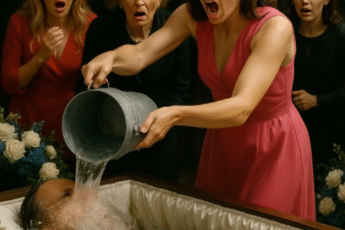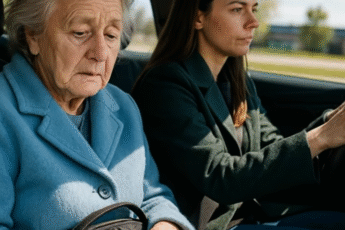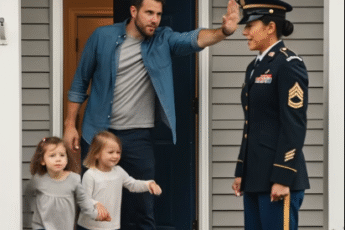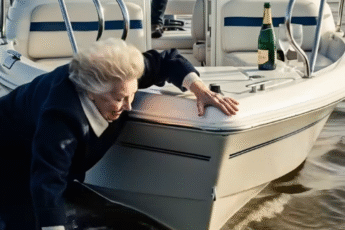I always believed in the quiet dignity of giving. Not the kind that asks for applause or leaves receipts taped to refrigerator doors, but the kind that expected nothing in return, that left people a little less burdened without them even realizing who had lightened the load. My name is Martin Grayson, and for seventy years, I played the roles this world assigned me: son, husband, father, provider.
I worked as a civil engineer for nearly four decades, often six days a week, missing school plays and Sunday brunches not out of neglect, but out of a deep-seated necessity. I told myself that every long night at the drafting table, every canceled vacation, every secondhand birthday gift would one day add up to security—something my children and grandchildren wouldn’t have to chase with the same desperation I once knew.
And in many ways, it did. They lived in homes I bought outright, drove cars I co-signed for, and attended schools I funded quietly behind the scenes. They smiled in family photos, arms wrapped around one another, oblivious to the mortgage payments I covered or the tuition bills I paid before they ever hit the mailbox. I didn’t need their gratitude. I only ever wanted their closeness. But that closeness, I came to realize, felt like something I had to rent, month by month.
There’s a particular kind of ache that settles in when you start to feel like a stranger in your own family. It doesn’t happen overnight. It creeps in through missed phone calls, text messages that go unanswered, and birthday wishes reduced to generic posts on social media. I used to think I was being too sensitive. They’re busy, I’d tell myself. You raised them to be independent. But deep down, I knew better. I could feel the way conversations tilted toward finances more often than feelings, how no one asked how I was sleeping, but everyone remembered to ask when the next property investment was maturing.
Despite it all, I planned my 70th birthday party with the kind of hope only a fool could summon. I thought maybe, just maybe, this would be the night I’d feel like more than a checkbook with a heartbeat. The house I rented for the occasion sat on the edge of Lake Marin, all glass windows and wraparound porches. I spared no expense: caterers, a live jazz trio, even a photo booth with silly hats. I told the planner to make it feel like a wedding because, in a way, I was renewing my vows to this family, even if they didn’t know it.
In my bedroom drawer, tucked beneath a stack of freshly ironed handkerchiefs, sat twelve white envelopes. Inside each was a personal letter and a check—sizable gifts meant to surprise each member of my immediate family. A down payment for a niece, a scholarship fund for my granddaughter, an all-expenses-paid trip to Italy for my son and daughter-in-law. I had written each note by hand, trying to pour a lifetime of unspoken warmth into the ink.
I stood by the window that morning, watching the early guests trickle in. My wife, Elaine, directed the florist like a general organizing troops. We had been married for forty-seven years, and while the romance had cooled into a quiet companionship, I had always assumed a foundation of respect remained between us. That assumption would prove as foolish as my hope.
As the evening picked up, I moved through the party, a host at my own gala. They all laughed, hugged me, and told me I looked great for seventy. I smiled through it all, even when my grandson, Luke, showed up an hour late in a wrinkled shirt. He was twenty, head full of big ideas and sarcasm, and I had paid for every class he ever took at his expensive private college. He barely looked me in the eye as he gave me a perfunctory hug. “Happy birthday, Grandpa. Still kicking?” he joked. Everyone chuckled. I laughed too, though something in my chest folded in on itself like an empty envelope.
The moment I still hear in my sleep came just after the cake was rolled out. People had gathered, clinking glasses. Luke, emboldened by the attention, stood on a chair and announced he wanted to give a toast. I leaned forward, my heart fluttering with a pathetic, hopeful anticipation. Maybe this is it, I thought. Maybe he’ll say something that shows he sees me.
He raised his glass, a smirk playing on his lips, and his voice rang out across the silent room. “To Grandpa,” he declared, his eyes sweeping over the crowd, “the man who thinks money can buy love!”
The room erupted in laughter. My sons, my nieces, my cousins—even Elaine. God, even Elaine. Her high, musical laugh cut sharper than any blade. The sting of betrayal didn’t hit like a slap. It settled more like frostbite: a spreading numbness, followed by a slow, crawling pain.
I didn’t say a word. I didn’t try to save face or demand silence. I just nodded, stood up from the head of the table, and walked out of my own party. Out in the driveway, the night air was sharp with an autumn cold that couldn’t touch the chill inside me. I sat in my car, not starting the engine, just staring at the black dashboard, the echo of their laughter a deafening roar in my ears. I had never felt so completely and utterly invisible.
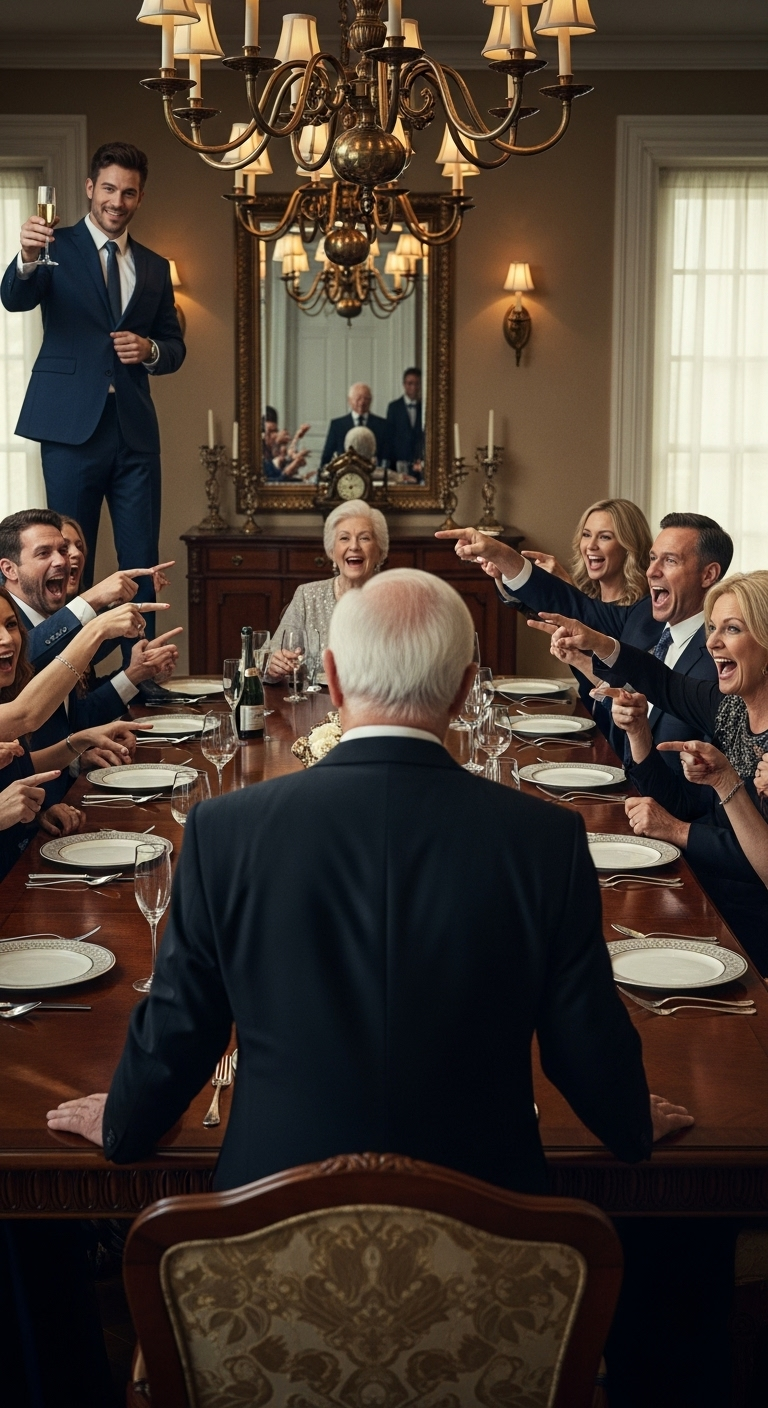
That night, I didn’t sleep. I sat at my kitchen table with a legal pad and a pen, rewriting my will from memory. Every asset, every account, every deed was redirected, not to the ungrateful bloodline I had bankrolled, but to causes that could never laugh in my face: hospitals, shelters, youth programs. I scratched out every name I had once written with love and replaced it with strangers who would never know my name but would feel the impact of my life’s work. For the first time in years, I felt a profound sense of clarity.
I didn’t answer the phone for three days. Not even when Elaine called from the upstairs landline to my cell, as if the twelve steps between our rooms had become an insurmountable distance. I kept replaying Luke’s words, and the laughter that followed. It wasn’t just a bad joke; it was a confirmation. A confirmation that this was how they saw me, how they had always seen me. They didn’t love me. They loved what I could provide.
I went to my lawyer’s office on a Tuesday. Harold Dawson had handled my estate for a decade. He looked up, surprised, as I walked in unannounced. I dropped the legal pad on his desk. “We need to redo everything,” I said, my voice calm. “All of it.”
He glanced through my shaky handwriting, his eyebrows rising. “Martin, are you sure about this?”
I looked him in the eye. “They laughed at me, Harold. They laughed because they thought they’d already won. Let’s show them they didn’t.”
It took less than an hour. I signed the papers with a hand that was steadier than it had been in years. By sundown, the estate was no longer theirs. I walked out of that building feeling lighter, freer than I had in decades. Back at the house, I went upstairs, pulled the twelve white envelopes from the drawer, and, one by one, ripped them in half. The checks, the heartfelt notes—all of it reduced to a pile of dead leaves on my desk.
The eviction notices were next. I could have staggered them, softened the blow. But grace had become the currency they spent too freely, and I was bankrupt in that department. My lawyer drafted them in cold, formal language with legally airtight timelines. The notices for the lakefront property my eldest son had been living in rent-free for six years, and the upstate cottage occupied by my nephew, went out the next day.
Elaine finally cornered me in the kitchen a few days later, her robe cinched tight like armor. “You’re really going through with this?” she asked, her voice low and sharp. “You’re going to throw your own family out into the street over a joke?”
I looked at her, really looked at her, and for the first time, I didn’t recognize the woman I had married. “It wasn’t the joke, Elaine,” I said. “It was the laughter. Yours included.”
She scoffed and turned away, muttering something about pride. But I didn’t apologize. I had apologized enough in this lifetime—for being too tired, too absent, too practical. I would not apologize for finally choosing myself.
It’s an eerie thing, rewriting your future when you’re closer to the end than the beginning. The calls started exactly twelve days after the party. First from my daughter, her voice trembling with a rage she felt entitled to. “Dad, how could you do this?” Then my son, less theatrical, but no less venomous. “You’re punishing us because someone told a joke. Grow up.” Not a single apology. They were angry because I had disrupted the script, because they believed I was too soft to ever cut them off. They forgot I had been poor once. I knew how to survive without help. They didn’t.
My eldest daughter, Melissa, was the first to make it public. She posted a family photo from a Christmas years ago, her caption a masterclass in passive aggression: “Funny how money can turn love into leverage. Some people forget who was really there.” The comments poured in, a chorus of sympathy for a narrative they hadn’t verified. I was painted as cold, controlling, a villain in a story I hadn’t agreed to be a part of.
The more they lashed out, the quieter I became. This wasn’t weakness; it was preservation. I had spent too long explaining myself to people who never truly listened. Access is power, and for years, I had handed it out like candy. Now, I was reclaiming it, one ignored message at a time.
The most difficult confrontation came when Melissa showed up unannounced, using a key I’d forgotten she had. “You’re really going to do this, Dad?” she demanded.
I finished slicing an apple before I answered. “I didn’t do anything to you, Melissa,” I said, my voice calm. “I just stopped pretending your disrespect was love.”
She ranted for a while after that—about her kids, her mortgage, the embarrassment of it all. She never once said she was sorry.
“You have thirty days to find a new place,” I told her when she was done. “Use them wisely.”
Elaine watched all of this unfold with a silent paralysis. One night, she stood in the doorway of my study. “Do you even care what this is doing to the family?”
I looked up from my desk. “I care that I let it go on this long.” She flinched as if I’d struck her. The truth had sharpened inside me; I could no longer cushion it with soft words. From that night on, she began sleeping in the guest room.
The confrontation I knew was coming was orchestrated by Elaine. She suggested lunch at Murphy’s Diner, a place steeped in nostalgia from our early, leaner years. I walked in and saw them: Melissa, Luke, my son Alan, even my nephew, Jonathan, all seated in a semicircle booth like a firing squad.
“We just want to talk, Grandpa,” Luke began, the fuse already lit.
“You didn’t give us a chance to explain,” Melissa added, her voice syrupy sweet.
I pulled out a chair at the end of the table and sat, my hands folded. “You didn’t lose my money,” I said into the tense silence. “You lost my trust. And those two things are not the same.” The words landed like bricks. “You humiliated me. Not just with the toast, but with every laugh, every smirk, every whispered, ‘He’s too soft to say no.’ You made me the punchline, and you expected me to keep paying for the privilege.” My voice didn’t rise, but a new, unfamiliar strength resonated in it. “This isn’t revenge. This is clarity. I finally saw you all for who you’ve become. And I don’t like strangers living off my name.”
“We’re not strangers,” Melissa insisted. “We’re your family.”
“Then you should have acted like it.”
Luke scoffed. “Damn, you’re more bitter than I thought.”
That was it. The last flicker of my old self burned out. I leaned in. “You think this is bitterness? No. Bitterness would mean I still cared enough to be angry. This is indifference. You lost me. And once I’m gone, you’ll realize I was the only bridge you had to a life you didn’t earn.”
I stood, slid the chair back under the table, and walked out of that diner without looking back. Outside, the sun was too bright, the air too clean. I got in my car and let out a long, slow breath. The tremble was gone. I wasn’t angry. I wasn’t relieved. I was just… done.
In the months that followed, peace arrived in small, quiet moments. Making coffee in the morning and realizing I wasn’t lonely. Sitting on the porch without feeling the need to check my phone. Elaine eventually packed a small suitcase and left, not with anger, but with a quiet, disappointed finality. I converted the guest room into a reading room, filling it with old jazz albums and the books I had always meant to read. I was reclaiming the parts of myself I had filed away for the sake of being a provider.
The story of the man who rewrote his will after a birthday toast became a local legend. A few letters arrived, one from a woman in Iowa who said my story helped her cut ties with her toxic brother. Those letters mattered more than anything I had received from my own children in a decade. They understood.
Melissa sent a handwritten letter. She didn’t apologize, but she said she understood. She said she had been afraid, that she thought my money made her secure, and without it, she wasn’t sure who she was anymore. It wasn’t a reconciliation, but it was a crack in the wall of her entitlement. I didn’t respond, but I didn’t throw the letter away.
I had spent seventy years making sure everyone else had what they needed, hoping it would earn me a seat at the emotional table. But some families lock you into the version of yourself that is most convenient for them. I had finally broken the lock. And that, more than anything, gave me back my life. Sometimes, walking away isn’t weakness. It’s the strongest thing you can do.

